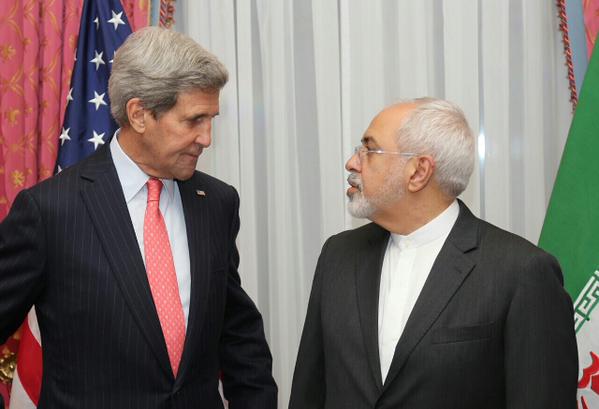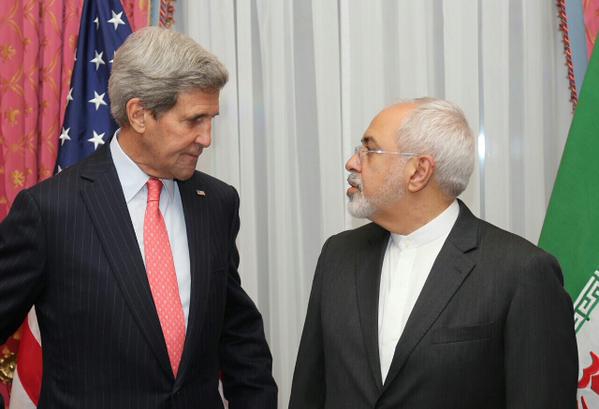 Iranian Foreign Minister Mohammad Javad Zarif meets US Secretary of State John Kerry in Lausanne on March 16, 2015.[/caption]
Iranian Foreign Minister Mohammad Javad Zarif meets US Secretary of State John Kerry in Lausanne on March 16, 2015.[/caption]LAUSANNE, Switzerland�-- The United States and Iran are plunging back into negotiations in a bid to end a decades-long standoff that has raised the specter of an Iranian nuclear arsenal, a new atomic arms race in the Middle East and even a U.S. or Israeli military intervention.
Two weeks out from a deadline for a framework accord, some officials said the awesomeness of the diplomatic task meant negotiators would likely settle for an announcement that they've made enough progress to justify further talks.
Such a declaration would hardly satisfy American critics of the Obama administration's diplomatic outreach to Iran and hardliners in the Islamic Republic, whose rumblings have grown more vociferous and threatening as the parties have narrowed many of their differences.
Officially, the United States and its partners insist their eyes are on a much bigger prize: "A deal that would protect the world," Secretary of State John Kerry emphasized this past weekend, "from the threat that a nuclear-armed Iran could pose."
Yet as Kerry arrived in Switzerland for several days of discussions with Iranian Foreign Minister Mohammad Javad Zarif, no one was promising the breakthrough.
One diplomat said new differences surfaced only in the last negotiating round of what has been a 15-month process, including a sudden Iranian demand that a nuclear facility buried deep underground be allowed to keep hundreds of centrifuges that are used for enriching uranium -- material that can be used in a nuclear warhead. Previously, the Iranians had accepted the plant would be transformed into one solely for scientific research, that diplomat and others have said.
Anything short of a written agreement will only encourage congressional critics of the Iran diplomacy, who've seized on various pieces that have leaked from the negotiation to press their case that the Obama administration is conceding too much.
"We believe very much that there's not anything that's going to change in April or May or June that suggests that at that time, a decision you can't make now will be made then,"�Kerry told CBS News�in Egypt before heading to Switzerland. "If it's peaceful, let's get it done. And my hope is that in the next days, that will be possible."
The wild card is whether hard-liners at home scuttle the deal, reports CBS News correspondent Margaret Brennan.
Republicans and some Democrats believe a deal would be insufficient and unenforceable, allowing Iran to eventually become a nuclear-armed state. And to that end, they've made a series of proposals to undercut or block an agreement, from requiring Senate say-so on a deal to ordering new sanctions against Iran while negotiations are ongoing.
Last week, 47 of the Senate's 54 Republicans signed an open letter to Iran's leaders warning that any nuclear pact they cut with President Obama could expire the day he leaves office. The action prompted fierce criticism from top administration officials, who declared it an unprecedented interference in the president's conduct of U.S. foreign policy.
Asked whether he might apologize to his Iranian counterparts for the letter sent by Senate Republicans, Kerry told Brennan, "Not on your life."
"I'm not going to apologize for the, for an unconstitutional, un-thought out action by somebody who's been in the United States Senate for 60-something days," Kerry said of the letter, authored by junior Republican�Senator Tom Cotton�of Arkansas.
The deal that had been taking shape would see Iran freeze its nuclear program for at least a decade, with restrictions then gradually lifted over a period of perhaps the following five years. Washington and other world powers would similarly scale back sanctions that have crippled the Iranian economy in several phases.
Iran says it is only interested in peaceful energy generation and medical research, but much of the world has suspected it of maintaining covert nuclear weapons ambitions. And the U.S. and its ally Israel have at various times threatened military action if Iran's program advances too far.
Kerry has said most of the differences between Iran and the negotiating group of the U.S., Britain, China, France, Germany and Russia were "political," not technical.
In any deal with Iran, the U.S. would insist on Tehran granting United Nations inspectors unfettered access to all nuclear facilities inside the country.
Speaking exclusively to CBS News before the talks in Switzerland, Kerry told Brennan that Iran must prove it would not use its existing nuclear enrichment program to try and build a nuclear weapon.
"They have an interest to live up to this agreement," Kerry told Brennan, "because if they don't, sanctions will come back, or possibly worse. We have an interest to live up to it because we want to be able to prove that it's (Iran's nuclear program) peaceful, and we therefore want to have insight into their program."
That insight, said Brennan, could come from regular inspections of Iran's five known nuclear plants, and at the Parchin military base, where the U.S. suspects Iran has conducted testing related to nuclear weapons.
So far, Iran has rejected any international inspections of its military bases. Other points of contention in the negotiations have been how much notice inspectors should have to give Iranian officials before inspecting a given sight, and how often those inspections should be carried out.
Less than four months ago, senior officials�talked optimistically about reaching a preliminary agreement�by March, with three months of additional talks only for any remaining technical work. Back then, British Foreign Secretary Philip Hammond said he expected "an agreement on substance" by March 31. Top Western and Iranian negotiators issued a joint statement vowing to use the time until June 30 only "if necessary ... to finalize any possible remaining technical and drafting work."
But two diplomats said ahead of this week's talks in the Swiss city of Lausanne that persistent differences at the negotiating table had diminished the chances of such a substantial agreement. Instead, they said, the sides were more likely to restrict themselves to a vague oral statement indicating that enough headway had been made to continue negotiations. They weren't authorized to speak publicly about the sensitive talks and demanded anonymity.
A senior U.S. official rejected that assessment. "We are working toward a framework of substance," said the official, who spoke on condition of anonymity citing similar constraints. Top diplomats and technical experts from the U.S. and Iran met Sunday. Kerry and Zarif were to hold their first discussion Monday.
Kerry told Brennan that, "to its credit," Tehran had entirely lived up to an interim agreement reached in November 2013.
But that understanding was only a stopgap measure, not doing nearly enough to satisfy the long-term concerns of Israel or Iran's Sunni Arab rivals in the Middle East, or the United States. Experts say the combination of limits on Iran's uranium program only gives the world two to three months to react if the country tries to surreptitiously "break out" toward nuclear weapons development. The U.S. says it needs at least a year of cushion time, lasting for at least a decade, in a comprehensive agreement.
It's unclear if negotiators will reach that point, putting the United States in a difficult spot. Fearful that Iran could be playing for time, Mr. Obama, Kerry and various officials have vowed to walk away from the talks if they show no sign of pointing toward a satisfactory agreement. And they've repeatedly stressed that "no deal is better than a bad deal." But none of them have spelled out what the U.S. strategy for preventing a nuclear-armed Iran would be then.
By CBS News











